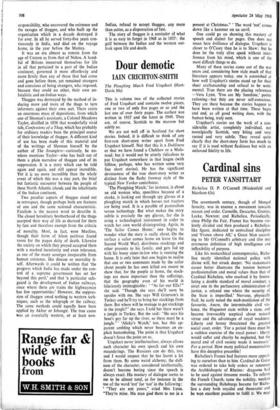Cardinal sins
PETER VANSITTART
Richelieu D. P. O'Connell (Weidenfeld and Nicolson 63s) The seventeenth century, though of Mongol ferocity, was in essence a movement towards reason and order. Corneille, Descartes, Grotius, Locke, Newton; and Richelieu. Periodically, since Philip the Fair, France has become vio- lently divided and then produced a Richelieu- like figure, dedicated to centralised discipline and 'France above All,' a Great Man accord- ing to Mr O'Connell's arbitrary and (for me) erroneous definition of high intelligence and inflexibility of purpose.
Like his monarchical contemporaries, Riche- lieu neatly identified national policy with divine will, but struck deeper. 'No statesman's career better illustrates the tension between professionalism and moral values than that of Cardinal Richelieu, who resolved it by formu- lating a double standard of moral conduct; a strict one in the perfunctory administration of justice, a relaxed one where the security of the State is imperilled.' Nervous, physically frail, he early noted the mob-mutilation of the favourite, Ancre, the interminable civil vio- lence, the Huguenot state within a state, and became irrevocably sceptical about natural virtue and the advantages of royal' weakness. Liberty and heresy threatened the greatest social asset, order. 'For a period there must be a ruthless exercise of the royal power: liberty would suffer and charity be neglected, but the moral end of civil society made it necessary.' For a period. How many political monstrosities have this deceptive preamble!
Richelieu's France had features more appeal- ing to ourselves than to him. Cardinal de Guise was ordered to take holy orders or renounce the Archbishopric of Rheims : dragoons had to be used against tiresome monks. To reform the French Church,- tame the nobility, weaken the surrounding Habsburgs became for Riche- lieu a duty both royalist and theocratic and he won excellent position to fulfil it. We may
smile as at a figure from The Mikado until recollecting the judicial murder of Marillac- in state affairs, Richelieu observed, justice does not demand 'authentic proof'—and worse. 'There is something to be savoured in the situation of the founder of international law [Grotius] and a cardinal of the Church engaged in ruthless bargaining to extend a war which had already magnified without parallel every human depravity, cannibalism not excluded.' Richelieu became Chief Minister, virtual Foreign and Home Secretary, virtual com- mander-in-chief at La Rochelle and in Savoy, Governor of Brittany, of Le Havre; Abbot of seventeen abbeys, General of the Cluniacs, Minister of Navy and Commerce (a co-founder of a multi-racial overseas empire); economist, though a faulty one; playwright, political and theological author, rebuilder of the Sorbonne, founder of the French Botanical Gardens. His craving for order, reaching into language itself, led to the creation of the French Academy.
Profoundly pledged to God, Pope, King, he could seldom trust them. Aware of the moral deformities of successful action, he felt that pacific scruples produced worse results than his own pragmatism. Often, and justifiably, conscience-stricken, he calculated his mercies and cruelties alike to the grandeur of France. 'The French,' he considered, `are capable of anything, provided that their rulers are capable of teaching them what they should practise.' Robespierre was to echo this: there are more modern examples. Ever seeking the expedient, his nature and policy were inclined towards possible compromises, but his total career had the moral and practical ambiguities of the grandeur that obsessed 'him. His role in the Thirty Years War became a clue to a later and hideous Germany. Like Bismarck, he made the throne too large for those likely to sit on it and the reaction in 1792 created a sinister grandeur of its own. No revolutionary, he achieved a 'subtle transformation of emphasis,' ministerial and bureaucratic responsibility slowly replacing the traditional play of noble factions.
Mr O'Connell's readers are not spared a tangled monotony of major wars and con- spiracies, minor campaigns and intrigues. Louis XIII emerges with more substance than usual. Middlebrows seeking a Dumas 'devil incarnate sitting pale-faced in scarlet stroking his cats with the long sinister fingers of a mandarin' will be disappointed, while specialists will probably not have to revise many judg- ments. Not glossing over Richelieu's errors or magnifying his successes, the author retains some sympathy for a legalistic charmer, per- sonally civilised but with axe and cell ever within reach, struggling not only against mul- tiple external threats but those within himself, sustained by Father Joseph and his own will. The question of greatness surely never arises. Tragic hero, perhaps, though qualified by Richelieu's prevailing irony and scholarly exactness. Creature of a bad time, he remains a remarkable warning for all times that over- revere systems. He should also be studied by those who yell loudest against political im- morality yet shirk the reponsibilities of action, preferably right action.







































 Previous page
Previous page